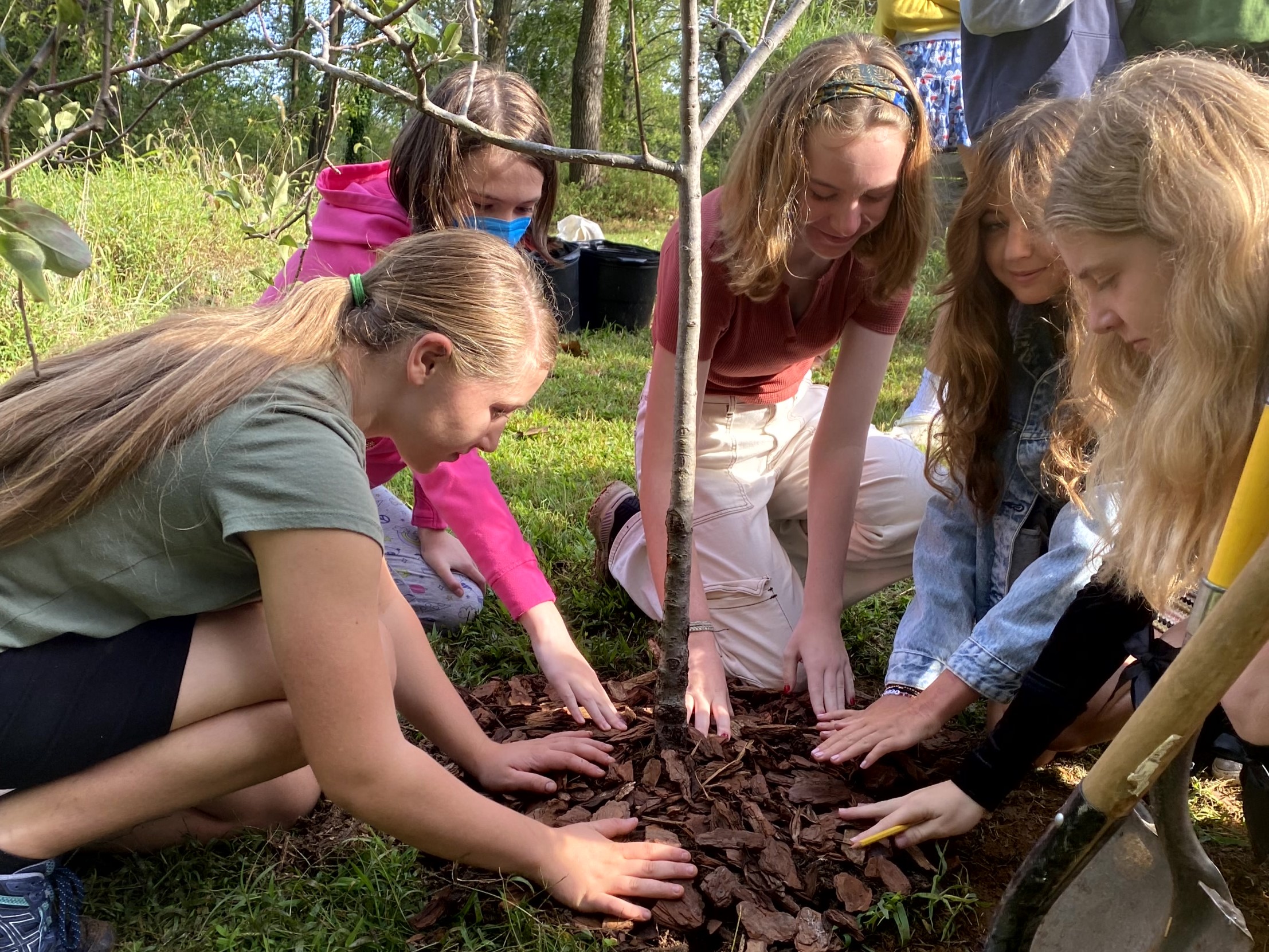

Adolescent Program At A Glance
Location: Upper Campus
Enrollment: 18-25 students
Ages served: 12-15 years (7th & 8th grade)
Staff: 4 full-time trained in Montessori pedagogy, 4 part-time specialists
Daily Schedule:
8:15-8:30 AM – Arrival window
8:30-12:15 PM – Math, Spanish, Wellness, Electives, Book Group, Advisory, Socratic Seminar
12:15-12:50 PM – Lunch
1:00-2:45 PM – Science, Humanities, Creative Expression, Advisory, Physical Expression, Chores
3:20-3:30 PM – Dismissal window
AP Staff
Program Director – Erin Foley
Faculty – Colin Cooley, Grant Hughes, Kristen Keyes
Specialists – Stacy Conlin (Mathematics), Brad Dawson (Woodworking), Teddy Peyton (Physical Expression), Diana Jiang (Spanish)
The Adolescent Program Community
Fostering responsible citizens
Our Montessori Adolescent Program (AP) is designed to meet the needs of early teens in the midst of becoming young adults. The AP makes schoolwork relevant, incorporating project-based learning in all courses of study and disciplinary subjects.
CMS is a place where each student’s interests, pursuits, and actions truly contribute to the betterment of the school community. It is a dynamic and empowering environment.
Montessori adolescent education fosters a love of learning and the freedom and responsibility needed to manage the workload of high school and college. We offer adolescents a community in which their intellectual interests are cultivated and their academic work has real-life applications. Our graduates are caring, adaptable, curious people who continue to contribute to their communities.
Land- and farm-based model
CMS uses a land and farm-based environment to link curricular subjects to real-world applications. Students study the sciences botany, zoology, physics, and chemistry, through four and five week projects that focus on, for example, raising chickens, beekeeping, organic gardening, food preservation, or creating simple machines.
Micro-economy
Dr. Maria Montessori believed that adolescents need to learn about money and its management. We do that here, and it’s a major underpinning of our program. Each year, students manage the micro-economy venture at the AP. They discuss purchasing raw goods, production, marketing, and selling. Students manage accounts, from setting budgets to meeting with bank branch managers. The goods produced depend on the interests of the students and the needs of the community each year and have included honey, fresh eggs, jewelry, soap, greeting cards, charcuterie boards, holiday ornaments, and many others.
Large number of teachers supporting a small student body
We seek a small teacher to student ratio because teens, as apprenticing adults, need to work side by side with well-rounded adults who believe in and cultivate their abilities and potential. In addition, more teachers means that our students will have a variety of classes to choose from, placing them more in control of their educational track.
Academic Areas of Study
Classes are composed of mixed-ages with an emphasis on differentiated assignments (same key concepts but the degree of difficulty and sophistication is specific to the individual student). We incorporate choice, in nearly every class or project, to encourage deeper engagement.
Humanities (History/Language Arts), Sciences/Occupations, Mathematics, Spanish, Socratic Seminars, Book Group
Physical & Creative Expression
Depending upon student interests and needs we may offer, but are not limited to hiking, basketball, soccer, ultimate Frisbee, martial arts, jewelry making, woodworking, song writing, stand-up comedy, drawing, painting, culinary arts and cooking, creative writing, and movie-making.
Community Responsibility and Managerial Roles
We offer a weekly wellness class and we focus on community responsibility via daily and weekly chores, weekly community council meetings, and cyclical managerial roles. Additionally, students take on additional responsibility by applying for various managerial positions throughout the year. Managerial examples include, hospitality, performing arts, shopkeeper, publications, garden steward, bees, and chickens.
Trips & Traditions
Odyssey Trip and Peace Retreat – Annual overnight trips focused on community building & reflection
Coffee House – Students share their various musical, theatrical, comedic, etc. talent with AP families
Community Play – Annual theatrical performance for families and friends

